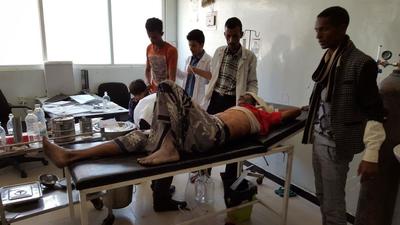This week, Médecins Sans Frontières/Doctors without Borders (MSF) will begin a vaccination campaign in Batangafo; the largest internally displaced persons (IDP) camp in Central African Republic (CAR).
MSF aims to vaccinate at least 18,000 children up to the age of 15 against measles and polio, as well as provide vitamins and treatment against parasites.
The campaign was initially scheduled to begin next month but a spike in suspected cases of measles among children in the camp has prompted MSF to start the campaign earlier in attempts to curb any potential outbreak or epidemic. The camp is home to 35,000 IDPs.
Forced out of home
A series of armed clashes that took place in the summer of 2014 in Batangafo forced hundreds of people to flee their homes, seeking protection in the IDP camp, which is located between the hospital and international peacekeeping headquarters.
Armed militias continue to attack and loot homes in the region, forcing even more residents out of their homes and into make-shift huts in the camp. Today, Batangafo’s neighbourhoods appear deserted.
Refugees from the north
Numbers in the camp continue to grow as residents from the surrounding areas outside Batangafo move in, seeking refuge not only from militia violence but also from attacks by the nomadic shepherd communities in the north.
While friction between nomadic and static communities over land at the end of the rainy season is common, the current state of war in CAR has exacerbated this fighting. Thousands of residents are being forced to flee armed nomadic groups that are becoming increasingly violent.
Pushing the limits
The consistent growth of the Batangafo camp, which was initially built for 12,000 people, is pushing the limits of the area of the camp (about two square kilometres). Having such a high volume of people in a small area increases health risks for people in the camp.
"Overcrowding is a major risk factor for the occurrence of diseases in the camp," says Carmen Terradillos, medical coordinator for MSF in Batangafo.
"In addition to starting the vaccinations, we are strengthening our hospital resources in case we see an increase of consultations. So far, there has been no large increase, partly because the first priority for many families is to find food for the day, so when someone is sick they don’t bring them to the doctor until their condition is severe."
In order to try and encourage residents to seek medical attention, MSF is enhancing health promotion activities among the displaced, and medical staff will begin regular surveillance visits to the camp.
No choice but to stay
Until a degree of security is restored in Batangafo, people in the camp have no choice but to stay. With the rainy season quickly approaching, this poses significant challenges. The huts in Batangafo camp are not built to withstand wet weather, and many of them are located in areas where water will stagnate.
"We would love to leave, we want to return home, but if we do not have our safety granted we'll stay and do whatever it takes to strengthen the huts. We will not leave," says Brigitte Befio, a Batangafo neighbour who has been living in the camp with her husband and five children for months.
"We will not move until the militias that attack us incessantly are disarmed," says Lea Nukofio, a 59-year-old woman who cannot recall such extreme levels of violence. She has spent the last two years fleeing militia attacks with almost one hundred people from her village, Kambakota, located about 50 kilometres west of Batangafo.
"We will not move from here until their weapons have been removed," she adds.
MSF’s efforts
The daily arrival of dozens of people from the areas surrounding Batangafo show that insecurity and violence continues throughout the area. MSF has five health posts around the village, but the lack of security makes most of them inaccessible to the people of Batangafo.
"These people are in an extremely vulnerable situation, even worse than those in the IDP camp. They have virtually nothing," says Terradillos.
"If there is no security on the roads we cannot provide essential medical attention," adds Stella Aprile, deputy head of mission for MSF in the country.
“In northern CAR, you find all the typical diseases in the country, such as malaria, respiratory infections and conjunctivitis, and they all remain undiagnosed and without attention if we cannot intervene."
MSF in Central African Republic
MSF has been working in the Central African Republic since 1997 and currently has more than 300 international and 2,000 Central African workers in the country. Since December 2013, MSF has increased its medical projects from 10 to 20 in response to the crisis, and is carrying out six interventions for Central African refugees in neighbouring Chad, Cameroon and the Democratic Republic of Congo.
In Batangafo, MSF manages the general hospital (165 beds) and supports five health centres in the periphery. Between December 2013 and the end of 2014, more than 37,000 people were provided medical assistance in the area and more than 500 surgeries were performed.





